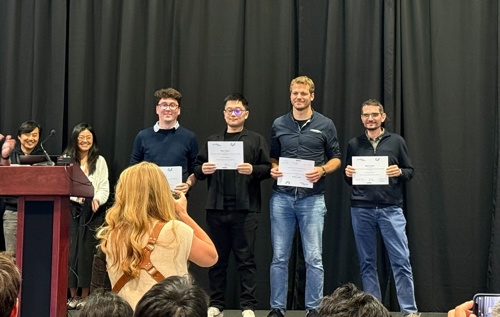30 Jun 2025
Oxford researchers awarded Best Paper at CVPR 2025
VGG team wins top prize at CVPR 2025 with 3D vision breakthrough

A team of Oxford-Meta researchers has received the prestigious Best Paper Award at CVPR 2025 for their work VGGT: Visual Geometry Grounded Transformer. This award recognises the top publication out of more than 13,000 submissions to the IEEE/CVF Conference on Computer Vision and Pattern Recognition.
The winning paper introduces VGGT, a novel approach for 3D reconstruction from one to hundreds of images. It does so by solving multiple 3D tasks, including estimating the cameras, scene depth, and correspondences across the images, with a single deep neural network in just a few seconds. Compared to established 3D reconstruction approaches, this makes it significantly easier to use for experts and non-experts alike. VGGT is released as open source for the benefit of practitioners and researchers.
The paper was authored by DPhil students from the Department of Engineering Science: Jianyuan Wang, Minghao Chen, and Nikita Karaev, together with Andrea Vedaldi, Professor in Engineering Science, Christian Rupprecht, Professor in Computer Science, and David Novotny, Research Scientist at Meta. The researchers are all current or former members of the Oxford Visual Geometry Group (VGG).

A team of Oxford-Meta researchers has receiving Best Paper Award at CVPR 2025
The research exemplifies the strength of the ongoing collaboration between Oxford and Meta, with the team including two Oxford-Meta DPhil students and a DPhil student interning at Meta. It marks a significant milestone for the Oxford-Meta DPhil programme and underlines the continued excellence and leadership of VGG in the global computer vision community.
Professor Christian Rupprecht says: “3D reconstruction is a challenging problem and difficult to solve without special domain knowledge. With VGGT, we wanted to build a model that is very easy to use. Therefore, the final method is much easier to use for various downstream applications in robotics, augmented reality, and other fields. We are pleased to see widespread adoption across many disciplines. This work came to life only through an incredible team and especially Jianyuan, who has dedicated his DPhil towards improving and simplifying 3D reconstruction.”
Professor Andrea Vedaldi says: “This is an outstanding result for our team. After three decades, the VGG is still one of the most impactful computer vision groups worldwide. It is also a very significant achievement for our collaboration with Meta, which maintains a strong commitment to genuinely open research via their DPhil sponsorship programme”.




